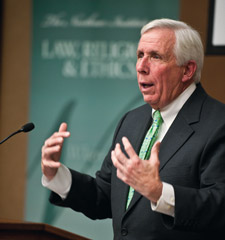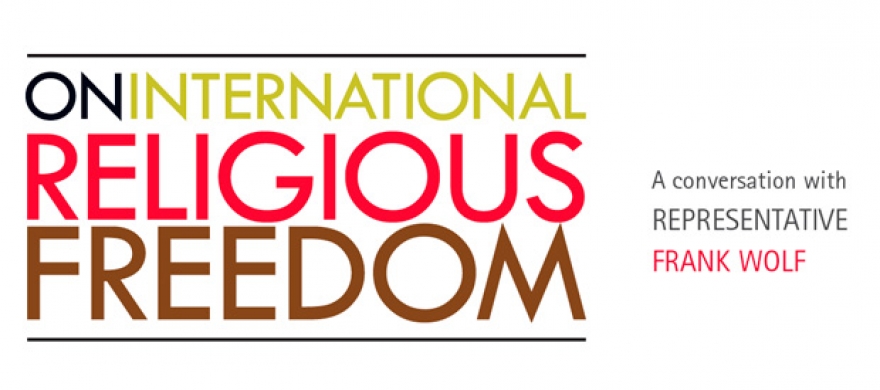“In recent years, the world has watched the brutal clashes between religions in Jos, Nigeria, and Orissa, India,” says Bob Cochran, director of the Herbert and Elinor Nootbaar Institute on Law, Religion, and Ethics at the Pepperdine School of Law. “We have heard, firsthand, the stories of the persecution of house churches in China, the Baha’is in Iran, and the recent bombings of Coptic Christian churches in Egypt. There is growing concern over the lack of tolerance between faiths, particularly as the Muslim and Christian and secular worlds collide.”

The Nootbaar Institute grappled with the challenging topic of international religious freedom in a February conference exploring the increasing prevalence of religious clashes throughout the world and the critical need for tolerance. The 13 conference speakers included people who have worked for religious freedom in government positions, for NGOs, and as private citizens. Suzan Johnson-Cook, president and CEO of Charisma Speakers, and U.S. representative Frank Wolf offered keynote speeches.Wolf sat down to discuss key issues with Pepperdine’s Colleen Graffy, director of global programs, associate professor of law, and former deputy assistant secretary of state for public diplomacy for Europe and Eurasia at the U.S. State Department.
GRAFFY: Why should Americans care about international religious freedom?
WOLF: Ronald Reagan said the words in the Constitution and in the Declaration of Independence
were really a covenant for the entire world, not just for the people in Philadelphia
in 1776, or 1787 in the Constitution: “We hold these truths to be self-evident that
all men and women are created equal, endowed by their Creator, by God.” America has
been in the forefront of human rights and religious freedom, whether it be standing
up against Communism or speaking out on behalf of the persecuted in Sudan.
In the Bible there are so many passages about the persecuted and the oppressed; Jesus
talks more about the poor than almost any other issue. If you take your faith seriously,
not just selectively, then I think America, and all of us, are obligated to care about
the oppression. It is something very important that we should be doing.
GRAFFY: What can Congress do?
WOLF: Congress can do a lot of things. We have a Religious Freedom Commission that I helped set up about 10 years ago. I also have a bill in to create a special envoy to advocate for religious minorities in the Middle East—to advocate both within our own government and to advocate with other governments. For instance, the Christian community in Iraq before the war was about 1.5 million. Right now they’re down to about 400,000 to 500,000. Other than Israel, more Biblical activity took place in Iraq than any other country. Abraham was from Iraq. Rebecca was from Iraq. Jacob and the 12 tribes lived in Iraq. We have an obligation.
We now have a bipartisan coalition pushing to pass the bill to create a special envoy similar to what President Bush did when he had the special envoy with John Danforth to work on Sudan. This would be the same type of operation, same caliber of person, whose number one job would be to advocate for religious minorities, but mainly Christians, in the Middle East, Afghanistan, and Pakistan. There is a lot that Congress can do to advocate for people of faith, of all faiths.
GRAFFY: How did you first become interested in this?
WOLF: I had not traveled out of the country, except for Canada once, before I got elected to Congress. In 1984 my best friend in Congress, a liberal Democrat congressman named Tony Hall, urged me to go to Ethiopia, where they suffered a major famine. I naively jumped on an airplane and went up to a camp in Alma-Ata, run by World Vision and Mother Theresa. I got waylaid there. Every morning I saw many young people who had died overnight. That trip opened up my eyes to things that I had never known were taking place.
In 1985 Congressman Hall and I went to Romania under the Ceausescu administration; they were bulldozing churches, persecuting Christians, doing terrible things. I went to Sudan in 1989. The war between the Muslim north and Christian south went on for over 20 years. I saw the persecution, the hunger, and the famine, and I developed a love affair, if you will, for southern Sudan, particularly for the people in the villages. A week working in a feeding center in a Sudanese refugee camp is a life-changing experience. Had I not gone to Ethiopia, and had I not gone to Romania, and had I not gone to Sudan, my life and time of service in Congress would be totally different.
GRAFFY: What is your message to those considering public service?
WOLF: They ought to consider running for office because chances are they’re just as good as the congressman or senator in office. I wanted to be in Congress since the third grade, but I stuttered very badly and people told me that I could never run for office. But I did. I lost in ’76, I lost in ’78, I won in ’80, and I’ll just tell you, you ought to follow your heart.
If you really care about these issues—human rights, religious freedom, whatever the case may be—being involved in public service is very important. You’re not going to get the big bucks that you’d get at a Wall Street law firm, but you'll get the satisfaction that I think you really can’t get from a Wall Street law firm. I urge people to go ahead and do it, and you know what?— they really very well might win.
Representative Frank Wolf represents the 10th District of Virginia, and is serving
his 16th term in Congress. He is cochair of the Tom Lantos Human Rights Commission,
a bipartisan organization of Congress that works to raise awareness about international
human rights issues. Wolf sits on the Appropriations Committee and serves on the Transportation
and Housing and Urban Development Subcommittee.
